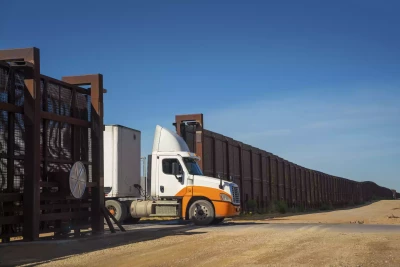DC Court Blocks FMCSA’s Non-Domiciled CDL Rule as Enforcement Tightens Nationwide
November 18, 2025
 The ongoing debate over non-domiciled commercial driver’s licenses (CDLs) has intensified following a series of major federal and state developments. The Federal Motor Carrier Safety Administration’s (FMCSA) interim final rule (IFR), which placed heavy restrictions on non-domiciled CDLs, has been temporarily halted by the U.S. Court of Appeals for the District of Columbia.
The ongoing debate over non-domiciled commercial driver’s licenses (CDLs) has intensified following a series of major federal and state developments. The Federal Motor Carrier Safety Administration’s (FMCSA) interim final rule (IFR), which placed heavy restrictions on non-domiciled CDLs, has been temporarily halted by the U.S. Court of Appeals for the District of Columbia.
The decision came after a lawsuit filed on behalf of longtime CDL holder Jorge Rivera Lujan, who argued that the rule unjustly prevented him from renewing his license. With the stay in effect, state licensing agencies can resume issuing and renewing non-domiciled CDLs until the court issues a final decision.
The FMCSA rule, which took immediate effect on September 29, remains open for public comment through November 28 and has already received thousands of responses from concerned drivers and carriers. While many drivers have voiced fears about losing their livelihoods, some industry groups and safety advocates support the rule, claiming it is necessary to strengthen road safety standards.
Meanwhile, enforcement actions related to CDL qualifications have ramped up across the country. In California, the Department of Motor Vehicles canceled 17,000 non-domiciled CDLs following a federal audit that found the state had issued licenses to drivers who did not meet federal eligibility requirements. U.S. Transportation Secretary Sean Duffy criticized California’s actions, calling it a “serious safety failure” and pledging continued oversight to ensure compliance.
At the same time, federal data show a sharp rise in enforcement of English Language Proficiency (ELP) standards for commercial drivers. More than 7,000 truckers have been placed out of service in 2025 for failing to meet ELP requirements, up dramatically from 1,500 earlier in the year. This increase follows a June executive order that reinstated English proficiency as a mandatory out-of-service violation, reversing prior guidance that had deprioritized enforcement.
The combination of new regulatory scrutiny, tightened enforcement, and ongoing legal challenges has created significant uncertainty for non-domiciled drivers and the carriers who depend on them. As the courts and regulators continue to shape the future of CDL policy, fleets across the country are watching closely for clarity on how these changes will impact driver availability and compliance in the months ahead.
For companies navigating these evolving regulations, Triple T Transport’s 3PL services provide reliable solutions for freight management, ensuring shipments stay on schedule and compliant with federal and state requirements, even amid shifting CDL enforcement policies.














